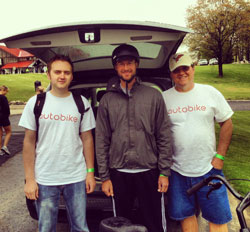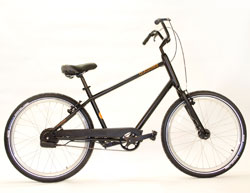Few new business ventures take off without uphill struggles. Especially one started by a group of old friends living in different states, working in different fields, and holding different degrees from rival universities.
So how apropos that the team who founded Autobike set out with the intent to get riders uphill with no struggle at all.
Going my way?
Autobike is just that—a two-wheeler that shifts gears automatically. Thanks to a powerful “brain” that lives inside a Pop-Tart-sized electronic circuit board, the Autobike shifts gears in sync with its pedals by analyzing the riding conditions hundreds of times per second. And, get this: That same pedaling motion recharges the brain itself. There’s also Bluetooth technology on board for interaction with iOS/Android devices.
At $1,000 per unit, this 21st-century upgrade of a 200-year-old invention is beginning to take off. About 100 Autobikes have been sold to date in 21 states (with sales in Canada and Israel too). Bike rental companies in Florida, South Carolina, and California now stock Autobikes. A recumbent bike-maker has expressed interest in buying the shifting system, and bike stores are taking notice of an automatic shifter that finally might be done right.
Most importantly, “We want to make bikes fun again, take people back to their childhood,” says former automotive engineer Sean Simpson, Autobike’s CEO and a current MBA student at U-M’s Ross School of Business.
Founding the business actually took him back to his own childhood—one of his partners includes boyhood friend Kevin Smith, a finance grad from Michigan State University who used to work on Wall Street. The Autobike team is rounded out by engineer John Czoykowski, BSME ’06/MSEE Energy Systems ’13; and Simpson’s dad, Mark, a chemist and Rutgers University alum. The team has since been joined by other engineers and techies.
Simpson cites the alchemy of their varied backgrounds—engineering, research and development, and finance—as one of the key factors in getting the business going. But the critical catalyst (cash) came last year from a Rhode Island-based start-up accelerator and a $10,000 Victors’ Challenge grant, funded by alumni from the Ross School and the College of Engineering.
Look mom, no gears!
It now appears the group may have hit upon a game-changer in the casual-rider sales category. California-based blogger TurboBob sees the Autobike as “something many riders have been waiting a long time for.” Closer to home, Brian Breslin, a cyclist and manager of Bikes, Blades, and Boards in Grosse Pointe Park, says he and his colleagues “were immediately impressed by the [Autobike’s] high quality and technology.”
“When we saw the new one, [at an event in Detroit last year],” he says, “we wanted to learn more about it. From what we’ve seen they really know what they’re doing with the engineering. As soon as we saw it we wanted to ride it and test it and look into to selling it.”
Automatic shifters have been tried before but with limited success, including an unrelated Autobike sold by infomercial in the 1990s. As Breslin sees it, previous automatic shifters were either poorly made or poorly marketed. One, a Shimano, was too costly for the casual rider, and the Autobike from way-back-when could be likened to a “Kmart blue light special with a shifter that was terrible. It was a crappy bike,” Breslin says. “The new Autobike is a totally different story.” Yes it’s expensive, he admits. “But they’re using expensive parts.”
The founders of the Troy, Mich.-based Autobike, with their “Evolve the Bike” motto, are hoping potential customers will recognize that value. The cruiser-style bike now on sale (a commuter version is in the works) rides butter smooth. At take-off it feels as if there’s no chain at all. The tension kicks in as the technology takes over, and the engineering circumvents the clanking of missed gears. Gone is the guesswork of which gear is ideal for the path ahead.The team plans to keep the focus on the everyday rider, while letting the big bike companies serve the serious cyclist, Simpson says. “We want a bike anybody can just hop on and ride after a day at the office, or on vacation Up North, or to the store.”
Hop on and ride
The friends-turned-partners came up with the Autobike a few years back when Smith, Simpson, his dad, and Czoykowski formed the Motor City Investment Club, a group of budding entrepreneurs intent on pinpointing a product or service that consumers would want to see improved. For months they met by way of video conference call, pitching and vetting all sorts of ideas. They were disciplined and focused in their approach, never missing a weekly call. Motivated by a common goal, they really wanted to be their own bosses, free from the cubicles and daily grind.

Autobike founders include childhood friends Sean Simpson and Kevin Smith, and Simpson’s father, Mark Simpson. (Image courtesy of Autobike.)
“We all worked for big companies, where there’s some kind of pecking order,” Simpson says. “We all saw how things were done, and how you had to follow a system that was in place instead of acting on ideas that could lead to accelerated product innovation.
“With our own business we had the freedom to use our education and our experience to put our ideas into action.”
Wheels in motion
One day they hit on an easy-to-ride bike for the recreational rider, and immediately saw the logic in a transportation-related invention by guys raised in the cradle of the automobile industry.
“We thought, like cars, why wouldn’t people want to move from manual to automatic transmissions?” Simpson says. “We started doing more and more research. We realized how many people must have bikes sitting in garages that just weren’t fun to ride anymore. We wanted to bring the fun back by making a bike that was easier to ride.”
Clearly the team was onto something. In summer 2012 the Autobike concept and prototype were accepted into a business incubator in Providence, R.I., called Betaspring. The 1.0 version of their early model was an ugly duckling held together by duct tape and Saran Wrap, “but it rode like a dream,” Smith says.
In her blog, Betaspring’s Melissa Withers recalls Smith and Simpson’s 11th-hour interview to get accepted by the accelerator. She writes, “They rolled up to Betaspring HQ in a van with a prototype bike in the back. They’d driven that day from Detroit for a ninth-inning finalist interview. [We] almost made them an offer in the street, immediately struck by their passion, serious engineering chops, and the down-to-earth vibe that only a Motor City company could muster for an on-asphalt interview in 90+ degree heat after an all-night drive.”
Smith and Simpson spent three months at Betaspring. They slept on mattresses on the floor of an apartment they shared with another start-up team and spent every spare hour perfecting the bike and the business model.

Autobike won the Victors’ Challenge, hosted by U-M alum Dhani Jones. (Image courtesy of the Victors’ Challenge.)
After launching from Betaspring that November, they hopped on a 5:45 a.m. flight and drove directly from the airport to Ann Arbor for the Victors’ Challenge competition Nov. 9, presented by the Zell Lurie Institute for Entrepreneurial Studies at the Ross School. They pitched the concept in front of an audience and expert panel, and picked up the $10,000 prize, which was funded by alumni donors Lee Gorman, BBA ’79/MBA ’83, and Mark Ritz, MSE ’75.
“The Victors’ Challenge was huge,” Simpson says. “Not only were we down to zero dollars, but the competition gave us a lot of great exposure and connections.”
Some $250,000 in investors’ seed money came next. The Autobike founders have since traded the corporate cubicle for rented space in an office/warehouse/assembly/delivery facility. The “daily grind” can now go all night, as work continues until 2, 3, and 4 a.m. regularly. The team relies on customer feedback to continually tweak the ride, the technology, and the business plan. Of course, there are bumps along the way.
“There’s been heated battles and disagreements, but because we have such a long history we hear each other out and always come back to what’s good for the business,” says Simpson of working so closely with family and friends. “We care about each other and trust each other. Of course there were times you would think, ‘That will never work or that’s a crazy idea.’ That still happens. But we talk it out. We figure it out.”
After all, it’s not that easy reinventing the wheel(s).




